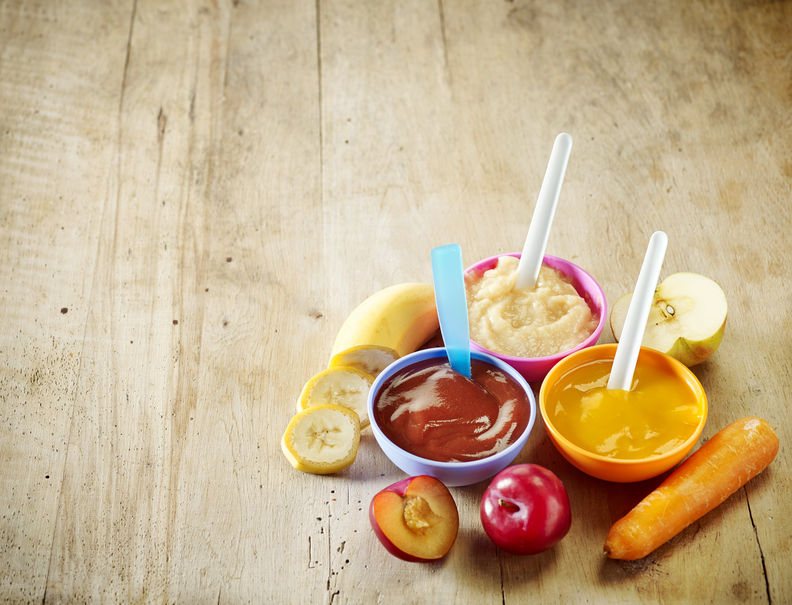
Whether to add salt to the baby’s supplementary food is the second largest family conflict after [whether to give the baby excrement and urine].
Six months later, the baby began to add supplementary foods. At this time, the sound began to be heard all the time:
-You can add salt to Eva!
-How can babies eat without salt and taste?
-Don’t give the baby salt, the baby has no strength!
The old man worked hard, the mother tried her best to defend, and the husband hid himself and did not speak… every meal was full of chickens flying and dogs jumping, and the sword was at loggerheads…
How can we convince the elderly with virtue and facts? Today we invited nutritionist Li Liangli to teach a series of unique skills!
Unique Trick One: Reasoning

1. The baby’s natural taste is weak and cannot eat too salty.
With the increase of age, people’s sensitivity to salt gradually decreases. Therefore, the sensitivity of babies to salt is much higher than that of adults.
The same food, which adults think tastes [just right], is actually too salty for Eva.
2. Excessive intake of baby salt is harmful,
1 g salt = 400 mg sodium
According to < < Reference Intake of Dietary Nutrients for Chinese Residents (2013 Edition) > >, the appropriate sodium intake for babies aged 6 months to 1 year old is 350 mg per day, and 700 mg per day for babies aged 1 to 4 years old, which is equivalent to less than 2 g of salt, basically the size of fingernails.
Sodium intake before the age of 1 can be completely obtained from breast milk, formula milk and natural food. If extra salt is given to the baby, there will be a lot of harm.
(1) Hypertension is more likely to occur when one grows up.
There have been clear studies showing that adding salt to your baby’s food too early will greatly increase your baby’s risk of hypertension in the future! Hypertension can lead to many chronic non-communicable diseases, such as stroke and cardiovascular diseases.
The World Health Organization has long strongly advised adults and children to reduce sodium intake to control blood pressure. It can be seen that eating too much salt, not to mention that babies can’t stand it, is not good for adults.
(2) Buried hidden dangers of cardiovascular diseases
The sooner the baby eats food added with salt (or other flavoring agents), the heavier the taste will be.
Once the heavy taste diet preference is formed, the taste of natural food is difficult to attract their interest. In this way, the baby will develop the habit of picky eating and partial eating, refusing to eat light taste food, laying hidden dangers for cardiovascular diseases.
(3) Affect eating
Excessive sodium intake will cause the baby to feel thirsty and want to drink water. Drinking too much water will lead to swelling and occupying the stomach, thus affecting the baby’s eating milk.
For salt, really don’t be infatuated with it. Don’t add salt within 1 year old, and don’t deliberately add salt after 1 year old.
The second trick is to convince the old man with facts.

Some mothers said that I understand all the truth you said, but the old people read it in their ears every day. Reasoning doesn’t make sense.
Most of the older generation are experienced in parenting. The original intention is good, but it is more difficult to accept new parenting knowledge. Moreover, due to the status of their elders, they are unwilling to admit that they are worse than their mothers.
If mothers can go to the kitchen by themselves, make some supplementary food that is delicious without salt, and bring it to the table. The rules and regulations will make the baby too fond of eating to stop, so the old people will naturally have nothing to say.
How can I make a supplementary food that tastes slowly without adding salt? Here are some private tips:
1. Choose more natural and tasty foods
Some natural ingredients have sweet or salty taste, and when cooking, it is also delicious to match them, for example:
Natural sweetness: fruit, cabbage, carrot, onion, sweet potato, pumpkin, fruit corn, red date, sweet pea, tomato, etc.
Natural salty: marine fish, kelp, laver, shrimp skin, shellfish, cheese, seaweed, etc.
Natural fresh: mushroom, pork, chicken, beef, mutton, fish, shrimp, shellfish, etc.
Natural fragrance: onion, basil, coriander, thyme, parsley, garlic, nuts, etc.
If the baby prefers sweet food, mothers can put more pumpkins, sweet potatoes, carrots, fruits and corn in the supplementary food to make them into mud or cut them into small pieces, such as pumpkin salmon mud, mushroom cabbage mud and sweet potato porridge, which are all nutritious, delicious and delicious foods.
If your baby prefers to eat salty food, you can eat some seafood. For example, steamed a small piece of silver cod, hairtail, or a shrimp crab what are all pure natural salty food. But don’t eat too much, match the staple food and vegetables, and have balanced nutrition.
If the baby’s appetite is not good, delicate flavor can play a role in increasing appetite. Like some mushrooms and meat, they all have such a effect. Chop them up and put a little in the baby’s supplementary food, and the delicate flavor will increase immediately.
2. Homemade Natural Seasonings

If mothers are free, they can also make some [seasonings] at home and keep them at home. They usually dig two spoons if they want to use them. Although it takes some time, it is definitely healthy, safe and loving compared with buying them directly outside.
Mushroom powder
Take fresh mushrooms, remove pedicles, wash, slice them, dry in the sun or bake them in the oven until crisp. Put them into a cooking machine, break them, and seal them for storage.
Shrimp flour
Buy fresh pale shrimps and soak them in water, change the water for 2-3 times in the middle to remove certain salt. Put them into the pan and stir-fry them over a small fire, then put them into a cooking machine to break them. The broken shrimps powder is put into the pan to stir-fry them again and evaporate the water. Seal and store them.
In a word, mothers have learned these low-salt and delicious complementary foods, and the old people in the family will naturally not say much about what when they see that their babies like to eat them. If the old man talks about it again next time, he can give them a taste:
No salt! It can also taste so good!
